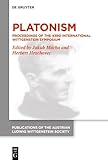Platonism : Proceedings of the 43rd International Wittgenstein Symposium / ed. by Jakub Mácha, Herbert Hrachovec.
Material type: TextSeries: Publications of the Austrian Ludwig Wittgenstein Society – New Series ; 29Publisher: Berlin ; Boston : De Gruyter, [2024]Copyright date: 2024Description: 1 online resource (XI, 504 p.)Content type:
TextSeries: Publications of the Austrian Ludwig Wittgenstein Society – New Series ; 29Publisher: Berlin ; Boston : De Gruyter, [2024]Copyright date: 2024Description: 1 online resource (XI, 504 p.)Content type: - 9783119149990
- 9783111386300
- 9783111386294
- 186.4 23//eng/20240813eng
- online - DeGruyter
- Issued also in print.
| Item type | Current library | Call number | URL | Status | Notes | Barcode | |
|---|---|---|---|---|---|---|---|
 eBook
eBook
|
Biblioteca "Angelicum" Pont. Univ. S.Tommaso d'Aquino Nuvola online | online - DeGruyter (Browse shelf(Opens below)) | Online access | Not for loan (Accesso limitato) | Accesso per gli utenti autorizzati / Access for authorized users | (dgr)9783111386294 |
Frontmatter -- Table of Contents -- List of Abbreviations -- Introduction -- Part I Plato -- Knowledge and Forms in Plato’s Parmenides and Sophist -- “It Seems to Me That Our Soul Is a Bit Like a Book” -- The Tool Analogy in the Cratylus -- Structure in the Sophist -- Unity through Hierarchy -- Cataclysms and Unbalanced Souls -- Socrates’ Dream -- Part II Platonism -- Platonism Versus Naturalism -- Thinking and Being Are Not the Same -- How to Be an Anti-Platonist -- Remarks on Parmenides, Plato, and Constructivism -- Platonism and Postmodernism -- Welche Gründe gibt es, Universalien anzunehmen? -- Being at Home in the World -- Visions of the Ideal City -- Part III Plato and Wittgenstein -- Why We Cannot Call Plato a “Platonist” and How That Might Matter for Wittgenstein -- The Fly-Bottle and the Cave -- Private Language in Plato and Wittgenstein -- Logic—Grammar—Logic -- Wittgenstein and the Socratic Dialogues -- Plato and Wittgenstein on Guessing -- Über zerlumpte Begriffe und ein “Leben […], worin für Hoffnung Platz ist” (Z, §469) -- Soul, Not Mind, Out There in the World -- On Wittgenstein and Socrates’ Use of Maieutic Devices -- Now You’re Talking My Language -- The Demands of Self-Constraint -- Index
restricted access online access with authorization star
http://purl.org/coar/access_right/c_16ec
The clean separation between manifold phenomena and a systematic order that prevails in them is a basic feature of the rational-scientific orientation system. The first authoritative formulation of this premise is found in Plato. His discussion of constitutive forms of world events has initiated a broad development in the history of philosophy, which is also effective today in the preference for reason-guided analyses of often confusing circumstances. The authors of this volume address the lasting relevance of this idea within two interrelated areas of research, namely Plato scholarship and contemporary Platonism. Of particular interest is the relationship between Plato and Wittgenstein. Following this overall idea, this volume is divided into three sections: Plato scholarship, Platonism, and Plato and Wittgenstein. As the contributions show, Platonism proves to be not only a purely historical-exegetical field of research but rather a fruitful stimulus for contemporary discussions on logical, linguistic, and social topics.
Issued also in print.
Mode of access: Internet via World Wide Web.
In English.
Description based on online resource; title from PDF title page (publisher's Web site, viewed 20. Nov 2024)


